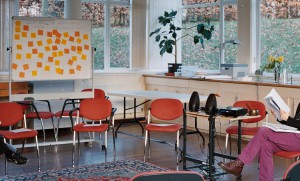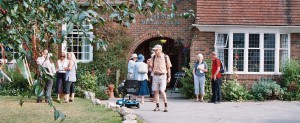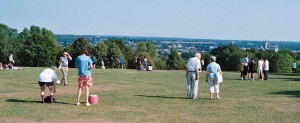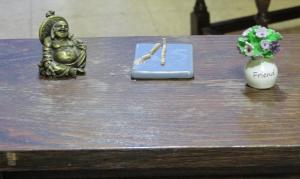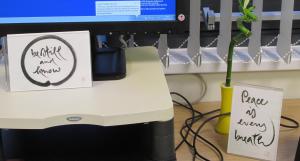I notice a request in the Quaker Life Network email that regularly lists opportunities for service that Friends can express an interest in. They are looking for Friends who are interested in visiting meetings to help the meeting discern the appropriate learning route for them.
‘I could do that’ says the voice in my head.
‘No, you couldn’t. You’re far too busy already’ I admonish myself.
The request is repeated in the next QLN email.
‘I could do that, maybe I should contact them.’
I send an email. I hear nothing.
‘Quaker News’ comes out. There is an article about this new project from Quaker Life and Woodbrooke – ‘Being Friends Together’. They are still looking for potential volunteers.
‘Maybe I should follow that up’
I email again. I hear nothing. But I note the training date in my diary.
It’s January. My diary is full. I feel busy. I could just drop this ‘Being Friends Together’ business.
I don’t. I ring Friends House. Repeatedly. I email again.
Eventually I get a reply. Yes, there is still a place. Yes, I can come. Just fill in the form.
The form needs Friends to support my application. ‘Oh, hadn’t thought of that’, and there’s only a few days to go.
I email two of my fellow elders about it. ‘Of course we’ll support you’ they say. They don’t say ‘Aren’t you too busy already?’
I send the form in.
On the appointed day I go to Friends House, despite engineering works on the underground. A lovely crisp bright morning makes it a pleasure to walk along the Euston Road instead. We are only eight, although fourteen were expected.
I’m glad to be there. Simon Best, Alistair Fuller and Oliver Waterhouse are welcoming and calm, but full of enthusiasm for this project.
We’ve looked at the online resource beforehand, but they help us explore further and understand the aims. They explain the model they have in mind for meeting visitors. We ask questions. For some there are answers, for others the issues need thinking through. It’s good to have raised them.
When we share out impressions of the day we are mostly a mixture of excited and slightly scared. Excited at the potential, slightly anxious at what we might find when visiting a meeting.
I came away with enthusiasm for this project and looking forward to the possibility of helping a meeting into using it. And with an unexpected message in my mind: ‘take Jesus with you’.
‘Being Friends Together’ is an online learning resource for Quaker meetings. It brings together the best of many learning resources that have been developed for meetings over many years and groups them into themes and pathways. Meetings may identify one off learning opportunities, or courses of study, resources for a study group or a discussion after a shared lunch or a weekend away. It can be used in many ways. Do take a look. I particularly liked the ‘topical activity’. One session that you can download and use straight away – just what is needed when the speaker for shared lunch can’t come at the last minute! You can browse for free, but for full access to download the resources a modest (£35) annual subscription is requested. For one subscription, the whole meeting has access.
For those who have members shared of the internet, be aware that this is an online resource, a library, it is not online learning. A few people in your meeting will need internet access, but the intention is that meetings will download the resources and use them in the ways we are used to (though some may use e-readers instead of paper copies).

